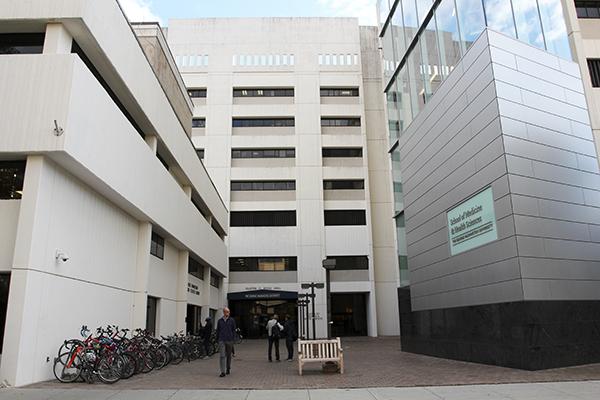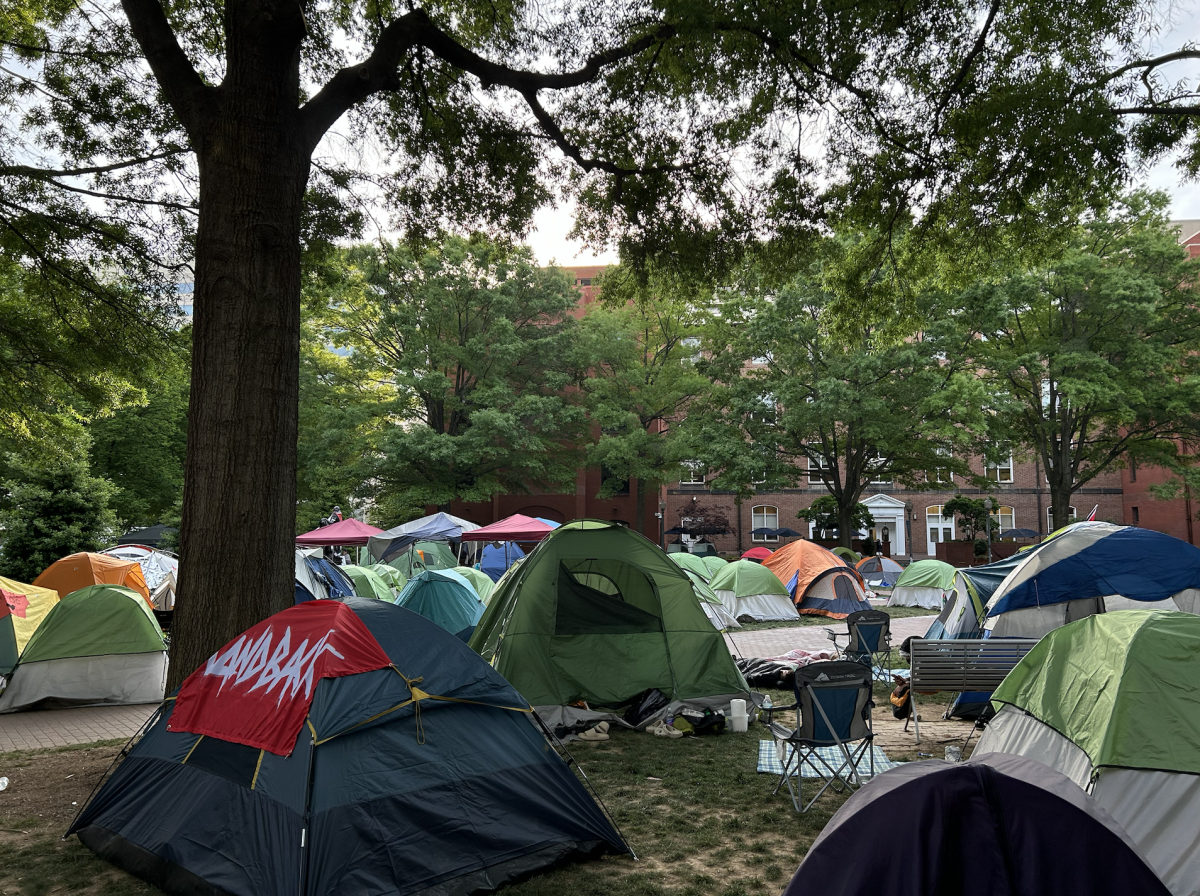Updated: Nov. 2, 2015 at 9:16 p.m.
The leader of GW’s laboratory safety is accused of plagiarizing academic papers and creating a harmful work environment.
Vinod Jyothikumar, GW’s lab safety officer, has been placed on administrative leave, a spokeswoman confirmed on Friday. She declined to say when the decision was made, but the announcement comes seven months after employees first told officials that Jyothikumar had copied other people’s work in his research papers. He allegedly copied large portions of texts from other academic journals and used other institution’s safety mandates on posters, websites and lab inspection forms at GW, a former University employee said.
After University officials were presented with information about Jyothikumar’s plagiarism beginning in April, they did not immediately take official action, the former employee said. Jyothikumar was also promoted to radiation safety officer in May, after officials initially heard the complaints.
A version of Jyothikumar’s resume from the spring listed 22 publications in which he had been published. That section was entirely removed in an updated version of his resume that GW officials submitted to the Nuclear Regulatory Committee in May, according to documents obtained by The Hatchet.
As universities push to raise their status and draw in large research grants, and as researchers aim to be the top in their fields, they are often under pressure to regularly publish new findings. GW has hired dozens of top researchers over the past few years, bringing in leaders like Vice President for Research Leo Chalupa to campus to help with several longterm goals, including opening 10 research centers by 2021.
Jyothikumar, who came to GW in 2014, did not return multiple requests for comment. Chalupa declined to comment for this story.
University spokeswoman Maralee Csellar declined to comment on details of Jyothikumar’s leave of absence, citing a University policy to not comment on personnel matters.
“Laboratory space on all of GW’s campuses are regularly inspected and the safety of our labs has not been compromised,” Csellar said.
Jyothikumar copied materials for at least six of his own papers from sources like the United States Patent and Trademark Office and the National Institutes of Health, as well as research papers from peer-reviewed journals, without providing citations, according to documents reviewed by The Hatchet.
Most of the plagiarized articles have been taken off the Internet, after he asked at least two of the publications to remove them in May, those publications’ publishers said.
One of Jyothikumar’s article, published in the International Journal of Biophysics in 2013, has 18 paragraphs copied from nine separate journal articles, according to a review by The Hatchet.
Employees in the research office noticed that safety posters Jyothikumar made to hang in Ross Hall were copied from other universities’ safety warnings, the former employee said. University websites from Jyothikumar’s department also had text that had been copied from Northwestern and Harvard universities and the University of Virginia, according to a review by The Hatchet.
Jyothikumar received degrees in biochemistry, biotechnology and molecular microbiology from the University of Madras in India and the University of Strathclyde in the United Kingdom. He came to GW with experience at the University of Virginia and at a private company consulting in pharmaceuticals and biotechnology, according to a copy of his resume that was obtained by The Hatchet.
‘They didn’t seem to want to do anything about it’
The former employee, who spoke on condition of anonymity because he quit his job at GW in May due to a toxic work environment, said he felt frustrated and helpless when his complaints about Jyothikumar were swept under the rug by GW officials. He said he met with officials in the human resources office at least three times to complain about the plagiarism.
Associate Vice President for Research Integrity Sheila Garrity told the former employee that Jyothikumar would lose his job in April after multiple employees pointed out the plagiarism, but he remained employed by the University, the former employee said.
“It was frustrating because they didn’t seem to want to do anything about it,” the former employee said.
Garrity, after meeting with others in the research office, requested that the former employee not reveal the findings to outside sources, including the publications in which Jyothikumar was published, the former employee said. The former employee never met with Chalupa.
“I told them, ‘This is my right under free expression to tell the publications because I didn’t steal the papers from anywhere,” the former employee said. “It sounded like they were tacitly threatening my job.”
A University spokeswoman declined to provide comment on the specific events described by the former employee.
Jyothikumar most recently plagiarized full sections in one article on overt and covert security inks in the magazine Ink World last August. David Savastano, the editor of the magazine, said Jyothikumar contacted him in May and asked that the article be taken down, and the publication immediately did so.
“When I looked back, that was one of the last articles I thought would have been plagiarized,” Savastano said.
GW has an academic misconduct policy that requires anyone who finds research misconduct to report it to the research integrity office. According to the policy, all faculty, staff and students who are affiliated with GW are required to follow the policy preventing falsification and plagiarism in research.
A “toxic” work environment
The former employee had met with HR employees and Garrity multiple times throughout the month of April, expressing concerns with his Jyothikumar’s inappropriate actions in the office.
He said there were issues with Jyothikumar’s “seeming lack of knowledge of lab safety, sexism and willingness to copy other universities’ websites.”
Jyothikumar had also copied Arizona State University’s lab inspection protocol sheet for the lab safety office’s inspection. Garrity asked the former employee to write up the inspection sheets himself.
In the past, faculty leaders have cited issues within the research office, including turnover of employees, that negatively impacted researchers’ abilities to earn top grants.
After multiple complaints through the Office of Human Resources about the supervisors, the former employee in Jyothikumar’s office stepped down due to what he called a “toxic work environment.”
Promotion after plagiarism complaints
Jyothikumar, whose earlier resume listed experience in laboratory and biosafety but not directly in radiation safety, was awarded more responsibility at GW even after officials heard complaints about the plagiarism.
Last May, Jyothikumar was promoted to radiation safety officer, overseeing and protecting the University’s radioactive materials and radiation-producing equipment, according to documents on the NRC website.
The former employee said University officials told him they could no longer afford to hire a part-time staff member to solely oversee radiation research. The GW website on radiation safety states that equipment that produces radiation is “commonly used in a wide variety of research,” but does not state exactly how many labs at GW conduct research involving radiation.
Jyothikumar was approved by the NRC to oversee the radiation office in May, but his official work at the University of Virginia and GW had been in biology and biosafety. A version of his resume submitted to the NRC in May showed he had completed trainings for radiation safety at Harvard University and GW, but the version did not indicate dates for those trainings. He is also now part of GW’s radiation safety committee.
The former employee added that there was no “good training” in the lab safety department.
“In my opinion, we didn’t get any useful training,” the former employee said. “We had meetings about stuff but were never taught how to be real lab safety people.”







